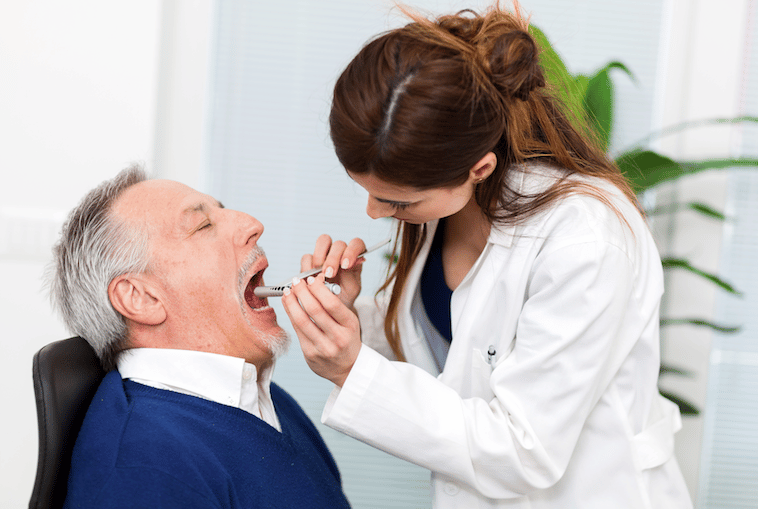Mouth Cancer Action Month–Take Action!


Mouth Cancer Statistics
The Oral Cancer Foundation (OCF) reported that about 49,750 people in the U.S. were diagnosed with oral cancer in 2017. The amount that will be diagnosed this year is about the same. About 132 people die every day from oral cancer.
According to the Mouth Cancer Foundation, the following statistics are true:
Mouth cancer causes more deaths per number of cases than breast cancer, cervical cancer or melanomas.
- Around 60,000 people will be diagnosed with oral cancer over the next decade.
- Tobacco use is still considered the main cause of mouth cancer. According to the World Health Organization, up to half of current smokers will die of a tobacco-related illness – including mouth cancer.
- Mouth cancer is twice more common in men than in women, though an increasing number of women are being diagnosed with the disease.
- Age is another factor, with people over the age of 40 more likely to be diagnosed, though more young people are now being affected than previously.
- Poor diet is linked to a third of all cancer cases.
- Experts suggest the Human Papilloma Virus (HPV), transmitted through oral sex, could overtake tobacco and alcohol as the main risk factor within the coming decade.
- Cancers can occur in any part of the mouth, tongue, lips, and adjacent areas like the throat, salivary glands, pharynx, larynx, sinus, and other sites in the head and neck area.
Warning Signs of Mouth Cancer
At its beginning stages, you won’t notice anything different in your mouth, but a dentist will notice the start of oral cancer.
In the later stages, patients report symptoms and signs such as:
- Bleeding in the mouth, seemingly for no reason.
- Numbness or loss of feeling in parts of the mouth.
- Lumps or bumps in the mouth, especially ones that continue to grow. That includes areas of thickening or swollen tissues.
- Rough spots or crusty areas on the lips, gums and other mouth tissues.
- Patches in the mouth that are velvety white, red or a speckled combination of the two.
- Sores on the face, neck or inside the mouth that bleed and don’t heal quickly.
- Changes in the way your voice sounds as well as chronic soreness of the throat that doesn’t go away.
- Weight loss that can sometimes be severe.
- Problems chewing, eating, swallowing, speaking or moving the tongue or jaws.
Oral Cancer Screenings are an essential part of safeguarding you or a loved one from the dangers of mouth cancer.
Mouth Cancer Prevention Tips
While some cases of oral cancer are not caused by lifestyle choices, most are. Smoking–in all its forms–and/or using chewing tobacco will raise your risk for oral cancer by 6 times. Get vaccinated for the HPV virus after speaking with your doctor. Be proactive in discovering if there is a history of oral cancer in your family. This makes you more susceptible to developing it nad means you need to make sure you are having your regular oral cancer screenings and eliminating all known risk factors.
Tobacco, alcohol, and betel quid (BQ) use have been recognized as risk factors of oral cancer, reports the National Institutes of Health (NIH).
Smokeless tobacco products are no better. In fact, they are worse for you. The chemicals they contain that are unnatural for the body. This includes dip, snuff and chewing tobacco. These tobacco products which come in direct contact with the gums and soft tissues of the mouth/tongue augment your risk for oral cancer by 50 times.
The Importance of Early Detection
“It is generally acknowledged that both prevention and screening of oral cancer are important, and the early diagnosis of oral cancer may result in less aggressive treatment, which in turn not only improves the quality-of-life but also the overall 5-year survival rate,” the NIH said.
To schedule your exam and oral cancer screening, call Dr. Ania’s office today at 303-443-0998!


